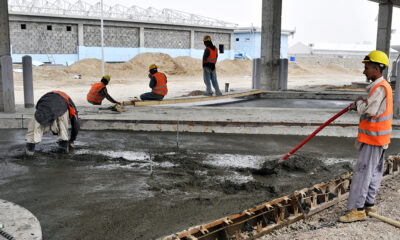COVID-19
India’s daily COVID-19 cases pass 400,000 as second wave worsens

India posted a record daily rise of 401,993 new coronavirus cases on Saturday as the country opened up its massive vaccination drive to all adults, although several states warned of acute shortages.
It was the first time India’s daily case count had topped 400,000 after 10 consecutive days over 300,000, Reuters reported.
Deaths from COVID-19 jumped by 3,523 over the past 24 hours, taking the total toll in India to 211,853, according to official data.
The world’s biggest producer of COVID-19 vaccines has a limited number of shots available, worsening a grim second wave of infections that has overwhelmed hospitals and morgues while families scramble for scarce medicines and oxygen.
Hundreds of people were seen queuing to be vaccinated across Ahmedabad, the main commercial city in Prime Minister Narendra Modi’s home state of Gujarat, on Saturday, Reuters reported.
The chief minister of the hard-hit state of Delhi on Friday implored people not to queue at vaccination centres, promising more vaccines would arrive “tomorrow or the day after”.
India’s eastern Odisha state said on Friday it had received a consignment of 150,000 shots but would only allow a few people to get shots due to lockdown restrictions preventing movement.
A fire in a hospital about 190 km south of Ahmedabad killed 16 coronavirus patients and two staff, the latest in a series of deadly accidents at hospitals.
Modi offered his condolences to the families of the hospital fire victims on Twitter, hours after he posted pictures of himself praying at a Sikh temple in capital New Delhi.
Some experts blame mass religious gatherings and political rallies for the severity of India’s second wave, which caught the government unprepared, Reuters reported.
A forum of scientific advisers set up by Modi administration warned Indian officials in early March of a new and more contagious variant of the coronavirus taking hold in the country, five scientists who are part of the forum told Reuters.
Despite the warning, four of the scientists said the federal government did not seek to impose major restrictions to contain the spread of the virus. Millions, largely unmasked, attended religious gatherings and election rallies that were held by Modi, leaders of the ruling Bharatiya Janata Party and opposition politicians.
The total number of COVID cases in India has topped 19 million. As the second wave has picked up steam, India has added about 7.7 million cases since the end of February, according to a Reuters tally. In contrast, it took India nearly six months to add the previous 7.7 million cases.
The surge in cases led U.S. President Joe Biden to impose new travel restrictions on India on Friday, barring most non-U.S. citizens from entering the United States.
Australian officials said residents and citizens who have been in India within 14 days of the date they plan to return home will be banned from entering Australia as of Monday, and those who disobey will face fines and jail.
Other countries and territories have also imposed similar travel restrictions on India, including Britain, Germany, Italy and Singapore, while Canada, Hong Kong and New Zealand have suspended all commercial travel with India.
COVID-19
WHO declares end to COVID global health emergency

The World Health Organization said Friday that COVID-19 no longer qualifies as a global emergency, marking a symbolic end to the devastating coronavirus pandemic that triggered once-unthinkable lockdowns, upended economies and killed millions of people worldwide.
The announcement, made more than three years after WHO declared the coronavirus an international crisis, offers some relief, if not an ending, to a pandemic that stirred fear and suspicion, hand-wringing and finger-pointing across the globe, AP reported.
The U.N. health agency’s officials said that even though the emergency phase was over, the pandemic hasn’t finished, noting recent spikes in cases in Southeast Asia and the Middle East.
WHO says thousands of people are still dying from the virus every week, and millions of others are suffering from debilitating, long-term effects.
“It’s with great hope that I declare COVID-19 over as a global health emergency,” WHO Director-General Tedros Adhanom Ghebreyesus said.
“That does not mean COVID-19 is over as a global health threat,” he said, warning that new variants could yet emerge. Tedros noted that while the official COVID-19 death toll was 7 million, the real figure was estimated to be at least 20 million.
Tedros said the pandemic had been on a downward trend for more than a year, acknowledging that most countries have already returned to life before COVID-19.
He bemoaned the damage that COVID-19 had done to the global community, saying the pandemic had shattered businesses, exacerbated political divisions, led to the spread of misinformation and plunged millions into poverty.
When the U.N. health agency first declared the coronavirus to be an international crisis on Jan. 30, 2020, it hadn’t yet been named COVID-19 and there were no major outbreaks beyond China.
More than three years later, the virus has caused an estimated 764 million cases globally and about 5 billion people have received at least one dose of vaccine.
In the U.S., the public health emergency declaration made regarding COVID-19 is set to expire on May 11, when wide-ranging measures to support the pandemic response, including vaccine mandates, will end. Many other countries, including Germany, France and Britain, dropped most of their provisions against the pandemic last year.
When Tedros declared COVID-19 to be an emergency in 2020, he said his greatest fear was the virus’ potential to spread in countries with weak health systems.
Most recently, WHO has struggled to investigate the origins of the coronavirus, a challenging scientific endeavor that has also become politically fraught.
COVID-19
COVID-19 in Iran: Nearly 900 new cases, 24 deaths recorded

The Iranian health ministry announced on Sunday that more than 890 new cases of COVID-19 have been identified across the country during the past 24 hours, adding that 24 patients have died in the same period of time, Fars News Agency reported.
“A sum of 891 new patients infected with COVID-19 have been identified in the country based on confirmed diagnosis criteria during the past 24 hours,” the Iranian Health Ministry’s Public Relations Center said on Sunday, adding, “454 patients have been hospitalized during the same time span.”
The ministry’s public relations center said 611 people infected with COVID-19 are in critical condition.
COVID-19
China says 200 million treated, pandemic ‘decisively’ beaten

China says more than 200 million of its citizens have been diagnosed and treated for COVID-19 since it lifted strict containment measures beginning in November.
With 800,000 of the most critically ill patients having recovered, China has “decisively beaten” the pandemic, according to notes from a meeting of the ruling Communist Party’s all-powerful Politburo Standing Committee presided over by President and party leader Xi Jinping, AP reported.
China enforced some of the world’s most draconian lockdowns, quarantines and travel restrictions and still faces questions about the origins of the virus that was first detected in the central Chinese city of Wuhan in late 2019. Heavy-handed enforcement prompted rare anti-government protests and took a heavy toll on the world’s second-largest economy.
The official Xinhua News Agency quoted Xi as saying that policies to control the outbreak had been “entirely correct.” The abrupt lifting in November and December of the “zero COVID” policy that had sought to eliminate all cases of the virus led to a surge in infections that temporarily overwhelmed hospitals.
Case numbers have since peaked and life has largely returned to normal, although international travel in and out of China has yet to return to pre-pandemic levels.
China is now transitioning to a post-pandemic stage after a fight against the outbreak that was “extraordinary in the extreme,” Xinhua said.
The government will continue to “optimize and adjust prevention and control policies and measures according to the times and situations with a strong historical responsibility and strong strategic determination,” Xinhua said.
-

 Sport5 days ago
Sport5 days agoAfghanistan qualify for U19 Cricket World Cup 2026
-

 Regional5 days ago
Regional5 days agoDeadliest US strike in Yemen kills 74 at oil terminal, Houthis say
-

 World4 days ago
World4 days agoThousands of protesters rally against Trump across US
-

 World5 days ago
World5 days agoIran, US end nuclear talks in Rome, agree to meet next week
-

 Latest News4 days ago
Latest News4 days agoPolio vaccination campaign launched in Afghanistan
-

 International Sports4 days ago
International Sports4 days agoIPL 2025: 14-year-old Vaibhav Suryavanshi becomes youngest IPL player
-

 International Sports2 days ago
International Sports2 days agoIPL 2025: Robo-Dog ‘Champak’ explained
-

 Latest News3 days ago
Latest News3 days agoChina invites various Afghan delegations to attend Shanghai forums
























